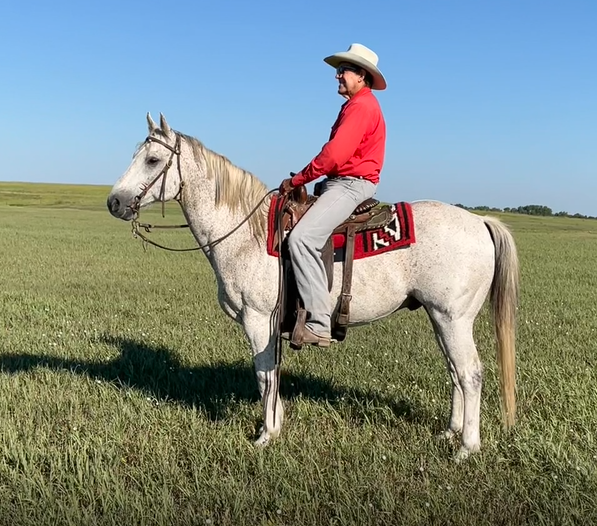“If you can’t ride a good horse, ride a gray horse.”
Apparently, that’s an old saying harassing those who stand out from other cowboys when riding a gray horse.
Actually, the quote hadn’t been heard personally until riding the gray gelding BB Zanes Hallelujah at the sale barn. The remark can become offensive when the horse really is a “good” horse.
Still, opinions about the quality or usefulness of a horse are widely varied. A horse that is appreciated by one cowboy, sometimes doesn’t appeal to another cowboy, and gets certain criticism.
That’s the way it is with this gray horse. The ranch manager blatantly declares: “That horse is no good.” Yet, he uses Hallelujah regularly for cattle counting and checking water gaps.
However, the old horse, formerly serving as one of the ranch broodmare service stallions, fits the manager’s dad just perfectly.
The son’s contention is that Hallelujah “doesn’t pay any attention to cows, won’t work cattle period.”
That may be the case, but that doesn’t mean he’s “no good.” The gelding is “safe” for an old wannabe cowboy to roundup Flint Hills cattle.
Mounting him on a cold morning in the dark, the gelding doesn’t have any buck or meanness. Hallelujah takes care of himself and rider in the steepest, roughest, rockiest native pasture.
There’s not a wide running creek or muddy waterhole that he won’t cross without any hesitation. Often horses resist going through water or jump over even the smallest puddle.
Admittedly, the gelding doesn’t “neck rein” very good, being “hard-necked,” resistant when turning. Yet, he goes when spurred and works just fine gathering two section pastures.
Likewise, the gray horse likes driving sale barn cattle paying no attention to cattle bawling, loudspeaker, or noisy hollering workers.
Noteworthy, Hallelujah, featuring two ranch-owned stallions in his pedigree, was ranch raised and trained. Before surgery, he sired more than 100 foals, several which became top using horses.
Gray horses dominate ranch pastures from breeding mares to gray stallions. because gray colts generally sold for more money.
Many gray horses appear white when they mature, yet a “gray horse” is definitely different from a “white horse.”
Reminded of Revelation 19:12: “Then I saw Heaven open wide, and oh a white horse and its rider.” Still, it might have been a gray horse turned white?
+++ALLELUIA++
XVI–34–8-21-2022
Gray Horse Is ‘Good’
A Cowboy’s Faith




